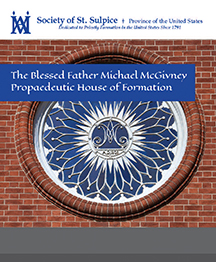The Blessed Father Michael McGivney Propaedeutic House of Formation

Formation Program Brochure
1. To Live Supremely for God in Christ Jesus
2. Built Upon a Long and Faithful Tradition
4. Human Formation: A Conscientious and Virtuous Disciple
5. Spiritual Formation: To Live in Union with the Triune God
6. Intellectual Formation: To Know and Love the Lord
7. Pastoral Formation: Practicing Self-Gift
Download the brochure as a PDF.
Text of the brochure follows.
1. To Live Supremely for God in Christ Jesus

Very Rev. Daniel F. Moore, P.S.S., SMSU Class of 1984
Provincial Superior
These are the words Fr. Jean-Jacques Olier used to describe the aim of the Seminary of St. Sulpice. It was a house to help men conform to Christ in an apostolic community centered on the Lord’s presence in the Blessed Sacrament so that, living supremely for God, they could truly say with St. Paul that it was no longer they who lived, but Christ who lived in them. (Pietas Seminarii 1; Gal. 2:20)
Since Olier’s founding of the Seminary and the Sulpician Fathers in Paris in 1641, the Society of St. Sulpice has been dedicated to the formation of diocesan priests. Our mission expanded with the establishment of St. Mary’s Seminary in 1791, the first Roman Catholic seminary in the United States.
Now we bring that history and tradition to a renewed vision of priestly formation for the twenty-first century as articulated by the sixth edition of the Program for Priestly Formation (PPF). After wide collegial consultation and at the request and encouragement of several bishops, we have established The Blessed Father Michael McGivney House of Formation at the original site of St. Mary’s Seminary.
The McGivney House is a program of formation for the propaedeutic stage as envisioned by the new PPF. The Sulpicians are excited to offer a home to seminarians beginning their preparation for the priesthood on the original site where priestly formation began in our nation. It is a regional program primarily serving St. Mary’s Seminary & University in Baltimore, Theological College in Washington, D.C., and several other dioceses in the Eastern region.
Our propaedeutic house provides seminarians an opportunity to get to know each other, discern reflectively, develop a sense of prayer, and deepen their relationship with Jesus Christ. We are confident that seminarians will find in The McGivney House the spirit, community, and space they need to begin their formation for priestly service in their local churches.
2. Built Upon a Long and Faithful Tradition
Impressed with the Society’s success in France and concerned to provide for the growth of the Church in the new United States, Bishop John Carroll invited the Sulpician Fathers to come to Baltimore to establish the nation’s first Catholic seminary.
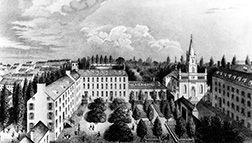
St. Mary's on Paca Street in the 19th century
In 1929 the seminary expanded to include a new campus in Roland Park. Later, in 1974, the program was consolidated at the new site and the old seminary building on Paca Street was demolished to make way for the present St. Mary’s Park. The Society of St. Sulpice, however, retained several of the original buildings: the chapel, the house that the Sulpicians gave to St. Elizabeth Ann Seton when she was forming her community, and the former convent for the sisters who served in the seminary. This convent is being significantly renovated and expanded and will serve as the main house for the program, accommodating up to twelve seminarians and two priest-formators.
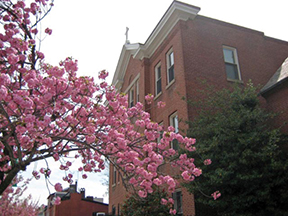
The former convent on the grounds of the original St. Mary’s Seminary in Baltimore—now being renovated and expanded into the new Blessed Michael McGivney House of Formation.
3. The McGivney House Program
Fr. Olier and the first Sulpicians founded the Seminary of St. Sulpice because they were convinced that diocesan priests consciously committed to the triune God through the Incarnation of the Lord Jesus Christ are essential to the Church’s growth in holiness. The McGivney House program unites this Sulpician conviction with the PPF’s vision of a propaedeutic stage at the beginning of seminary formation.
As stated in the PPF:
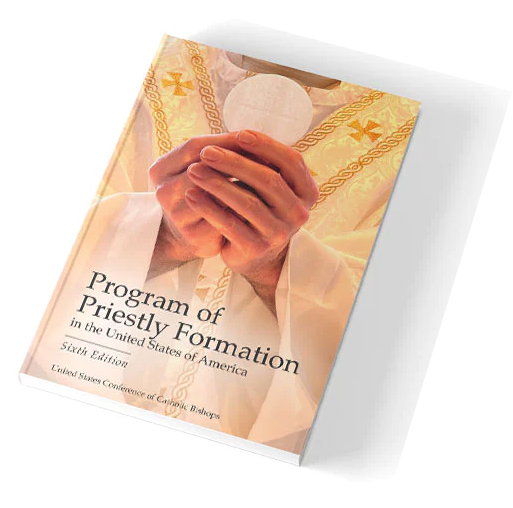
The propaedeutic stage seeks to provide seminarians with the basic groundwork they need to engage in priestly formation. Through no fault of their own, the requisite qualities for formation are often missing in new seminarians. A significant imbalance is present between the lifestyle promoted by contemporary society and priestly formation. There are many generous young men open to a priestly call who nevertheless need more intensive preparation before they are ready to enter into the discipleship stage of formation; thus, a propaedeutic stage prior to the discipleship stage is essential. (PPF § 119)
To fulfill this vision, The McGivney House provides:
- An intentional community of men devoted to Christ, to the Church, and to a year of growth, particularly in virtue and the spiritual life.
- A clear commitment to all four dimensions of formation, as appropriate to the propaedeutic stage, emphasizing the human and spiritual formation grounding the fruitful pursuit of seminary formation in the later stages.
- A facility distinct from the major seminary designed to foster the apostolic community envisioned by Olier and the PPF.
- An urban location that provides both easy access to pastoral and cultural opportunities in Baltimore, as well as a secure, private, and beautiful house, chapel, and grounds that foster a balance of contemplation and common life.
4. Human Formation: A Conscientious and Virtuous Disciple
While The McGivney House program addresses all four dimensions of priestly formation, it places particular emphasis on human and spiritual formation (PPF § 120). In its human formation dimension, the McGivney program seeks to help the seminarians move from “self- knowledge” to “self-possession” to “self-gift.” (PPF § 188) Their “human personality” becomes “a bridge and not an obstacle for others in their meeting with Jesus Christ.” (PPF § 182) “Following St. Thomas Aquinas,” the program is designed to be an “education in the human virtues perfected by charity.” (PPF § 204)
Upon completion of the propaedeutic stage, the PPF indicates that the seminarian should:
- Have grown in self-knowledge, particularly recognizing his areas for growth.
- Be able to form friendships, maintain appropriate boundaries, and have good social skills and a capacity for empathy and adaptability.
- Grow in self-discipline in all areas of his life, i.e. chastity, time management, the use of technology and other goods, obedience.
- Have well-developed habits of self-care.
To help the seminarian achieve these goals, the program includes:
- Weekly morning sessions dedicated to presenting, discussing, and reflecting on a comprehensive range of topics related to the virtues, self-knowledge, and interpersonal relations.
- Occasional workshops by experts in areas such as nutrition, conflict management, de- escalation, and addiction.
- Periodic presentations on and practice of skills related to common life and to liturgical life: such as kitchen skills, dining planning and etiquette and sacristan and chant practice.
- Community building and cultural awareness through outings to fine and performing arts and sporting events, outdoor excursions, and pilgrimages.
- Periodic communal fasting from technology and media.
5. Spiritual Formation: To Live in Union with the Triune God
As grace perfects nature, so “human formation leads to and finds its completion in spiritual formation.” (PPF 225) The aim of the Christian spiritual life is “to live in intimate and unceasing union with God the Father through His Son Jesus Christ, in the Holy Spirit.” (PPF § 226; PDV 45) In a statement that could have been taken from Olier’s own works, the PPF specifies that spiritual formation in a seminary promotes this union by helping the seminarian to “interiorize the sentiments and ways of acting of Jesus Christ.” (PPF § 228; cf. Catéchisme Chrétien 1) This formation is grounded in participation in the liturgy, particularly the Eucharist, which “is itself a participation in the heavenly Liturgy offered by Christ, our great High Priest.” (PPF § 229; Sacr. Conc. 8)
By the end of the propaedeutic stage, the PPF (§ 235) indicates that the seminarian should:
- Be familiar and disciplined with respect to public and private prayer.
- Be able to make good use of spiritual direction.
- Understand and incorporate silence in his life.
- Have grown in understanding the spiritual dimension of consecrated celibacy.
- Have grown in understanding the priestly vocation in a diocesan context.
- Have a capacity to read and meditate with Sacred Scripture.
- Have grown in his capacity to speak about his relationship with Christ in the Church.
The McGivney House program aims to help seminarians achieve these benchmarks by:
- Centering the day on a celebration of the Mass and the Liturgy of the Hours that is faithful and beautiful. The McGivney House benefits from both the main Chapel of the Presentation of the Blessed Virgin, built in 1808, and a new in-house adoration chapel. The seminarians will be trained in the basic duties of maintaining the chapels and sacristies and in basic liturgical chant.
- Ample opportunity for both private and communal adoration of the Blessed Sacrament.
- Regular spiritual direction.
- Three week-long retreats and other days of reflection throughout the year.
- A weekly class, together with other presentations, introduces the seminarian to the full range of private and communal prayer, devotion, and spiritual discipline, as well as the thought and practice of the principal schools and key figures of Catholic spirituality.
- Exposure to and participation in models of small-group faith sharing.
6. Intellectual Formation: To Know and Love the Lord
As we cannot love that which we do not know, and we seek to know more about those we love, so “there is a reciprocal relationship between spiritual and intellectual formation.” (PPF 261) The seminarian’s study is aimed at enabling the seminarian both to have “personal knowledge of the Lord Jesus Christ” and to aim to use that knowledge for the good of the Church, particularly in “the teaching office of the priesthood.” (PPF §§ 263, 265)
During the propaedeutic stage, the seminarian is expected to acquire and demonstrate:
- A basic understanding of Catholic doctrine as taught in the Catechism of the Catholic Church (§ 268), and as found in the Fathers, the Councils, and as expressed in the lives of the saints (§ 269).
- A basic knowledge of Sacred (§ 271)
- Good habits of study, intellectual curiosity, and a love of (§ 271)
- An understanding of the Catholic priesthood, especially as an aid to vocational discernment. (§ 296)
Seminarians in The McGivney House programs will achieve these goals by participating in three courses over the span of the program, each meeting for two hours per week: The Catechism of the Catholic Church, Introduction to the Bible, and Introduction to the Catholic Spiritual Life. These courses will be pass/fail.
These classes will be supplemented by presentations on Catholic art, architecture, literature, and music, with experiences designed to promote the seminarian’s appreciation of the sacred patrimony of the Church.
The program will seek to accommodate and assist those seminarians whose educational background indicates a need for further language study or other course work. (PPF § 271)

Aspirants will study An Introduction to Scripture, Essential Catholic Doctrine (Outline: The Catechism of the Catholic Church), and the Traditions of Catholic spirituality.
7. Pastoral Formation: Practicing Self-Gift
From among the many feasts honoring the Blessed Virgin Mary, Fr. Olier chose the feast of her Presentation in the Temple (Nov. 21) as the patronal feast of the Society of St. Sulpice and the Seminary. He saw in the Virgin’s willing offering of herself to the service of God in the temple a most fitting image of that self-gift that he sought to imitate himself and foster in those preparing to serve as priests. Pastoral formation offers seminarians opportunities to practice this self-gift, particularly in charitable works (PPF § 373), together with guidance as to how to integrate those experiences theologically. Enabled by grace to give of themselves to the service of God and the Church, they can become more prepared for the later stages that will form them to be “true shepherds of souls after the example of our Lord Jesus Christ, teacher, priest, and shepherd.” (PPF § 369, PDV 57)
The PPF (§ 373) indicates that seminarians in the propaedeutic stage should:
- Have contact with, and service to, the poor and the less fortunate.
- Develop a habit of self-donation and spirit of generosity.
- Demonstrate a capacity to work with people with different cultural backgrounds
- Grow in awareness of the pastoral situation in the local, national, and global Church.
- Demonstrate an awareness of and capacity to comply with relevant professional and ethical standards. (§ 370n)
The McGivney House program helps seminarians meet these goals by using the many opportunities available in the Baltimore area for service to the poor and others in need. Seminarians will have opportunities to engage in weekly, supervised apostolates to those in need of food, to the elderly, to inner-city students, and others. Seminarians will also serve the McGivney community in their weekly house jobs.
8. Time in the McGivney House
The McGivney House horarium seeks to provide the seminarians with a balance of communal and private prayer, learning, and engagement.
The year is divided into four parts: an introductory period in which the seminarians are oriented to the House and program, experience the opening retreat, and participate in sessions designed to foster community and self-awareness in preparation for making their personal goals. This is followed by two roughly 15-week periods in the Fall and Spring. The program concludes with a month devoted to a Marian pilgrimage and a final summative period for evaluation and a resolution to continue in priestly formation or pursue a different state of life (PPF § 122).
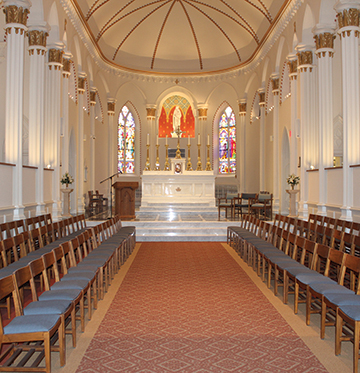
Inside the original Seminary Chapel on Paca Street, adjacent to the Blessed Father Michael McGivney House of Formation.
The Horarium
Mondays–Fridays
A.M.
7:00 Chapel, Meditation
7:30 Morning Prayer
7:45 Breakfast
8:45–11:15 Class
11:30 Mass
P.M.
12:15 Lunch
1:15–4:45 Spiritual Direction, Formation Advising,
Recreation, Reading
5:00 Chapel, Adoration/Meditation
5:30 Evening Prayer, Rosary
6:00 Dinner
7:30–9:00 Study, Reading, Prayer
9:00 Night Prayer
9:30–5:30 a.m. Grand Silence
Schedule modified on days with apostolates, feast days, or for pilgrimages or excursions.
Saturdays
8:30 a.m. Mass
Saturday is a free day for the seminarian.
Sundays and Solemnities
A.M.
9:00 Morning Prayer, Chanted
9:30 Mass
10:30 Brunch
Seminarian is free until 5:30 p.m.
P.M.
5:30 Solemn Evening Prayer, Chanted
6:00 Dinner
9:00 Night Prayer
9:30–5:30 a.m. Grand Silence
9. The Facilities and Location
The McGivney House is located in historic downtown Baltimore, which provides many opportunities to draw on the resources of the wider community. Baltimore and Maryland itself are the starting points of Catholic history in Maryland. Near the Paca Street location is the nation’s first Catholic cathedral, the Basilica of the Assumption. An easy day trip will arrive at the point where the Ark and the Dove made land on March 25, 1634, with the first settlers of Maryland: Catholic laity and Jesuit priests from England.
The McGivney House includes the main building, which offers private rooms to each seminarian with bathrooms shared between two rooms, ample communal spaces, and an adoration chapel. The Chapel of the Presentation of the Blessed Virgin will serve as the principal space for liturgies and prayer. The secure site also includes private and semi-private gardens, so that the McGivney House provides seminarians with a place of quiet repose in the midst of the city.
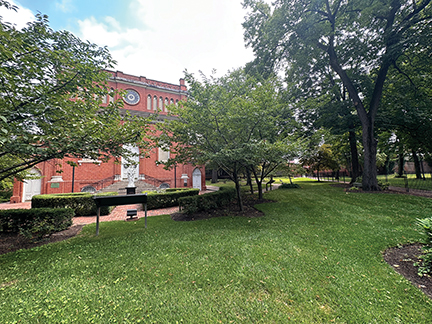
Above is the Seminary Chapel on Paca Street, adjacent to the Blessed Father Michael McGivney House of Formation.
Below are views of the private gardens on Paca Street, part of the House of Formation grounds.
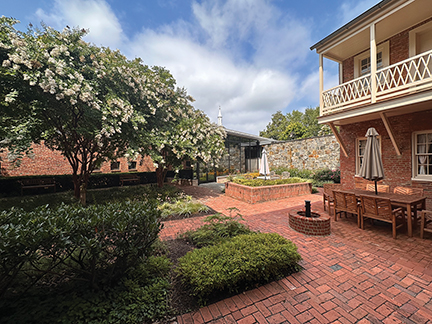
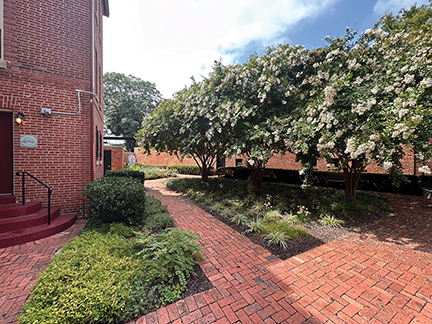
Contacts for Information
Rev. Shawn D. Gould, P.S.S., J.D., S.T.D. (cand.),
Director,
sgould@sulpicians.org
Carleen P. Kramer
Executive Assistant to the Provincial Superior Very Rev. Daniel F. Moore, P.S.S.
Society of St. Sulpice, Province of the United States
Provincial House
5408 Roland Avenue
Baltimore, MD 21210-1988
410-377-6024 (direct) • 410-323-5070 (main office)
410-433-6524 (fax)
ckramer@sulpicians.org
Fees and Financial Information
Contact Carleen Kramer (information above).
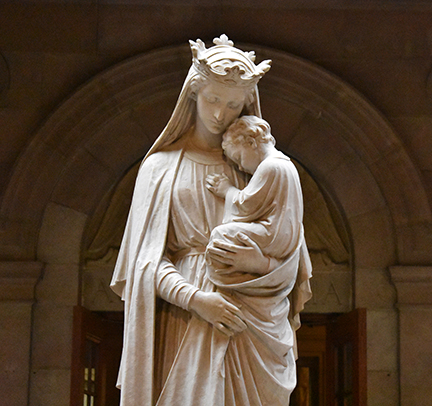
Sedes Sapientiae
Our Lady Seat of Wisdom, the work of French sculptor Henri Bouriche (1826–1906).
U.S. Sulpicians adopted this image as a visual reminder of Olier’s prayer:
O Jesus living in Mary, come and live in your servants.

